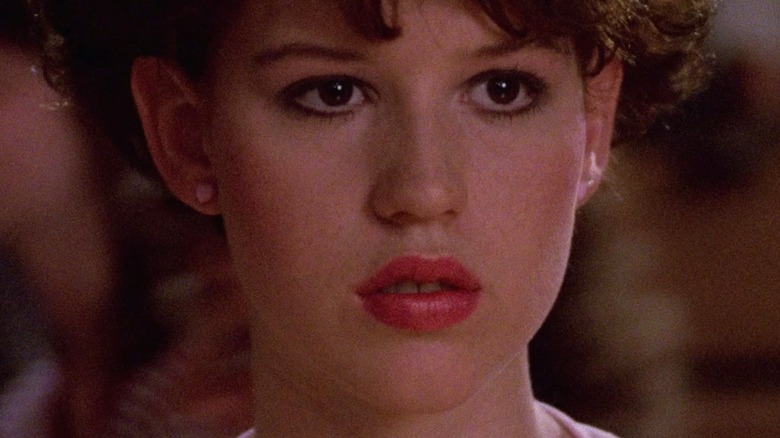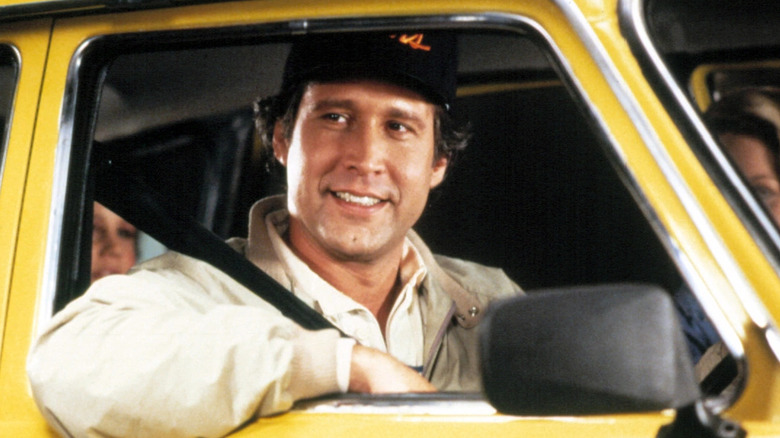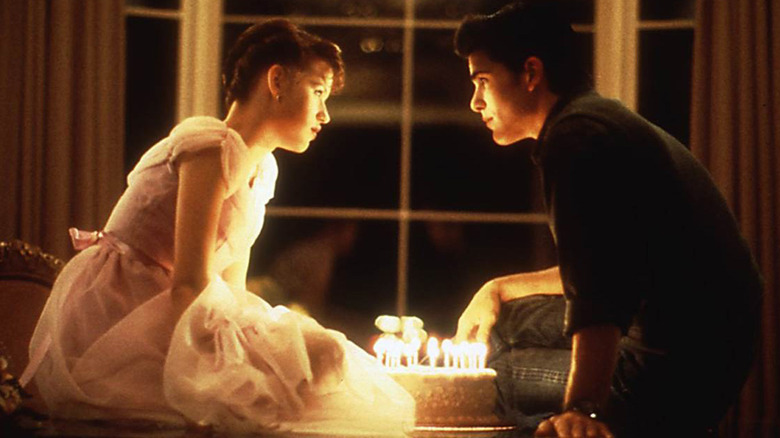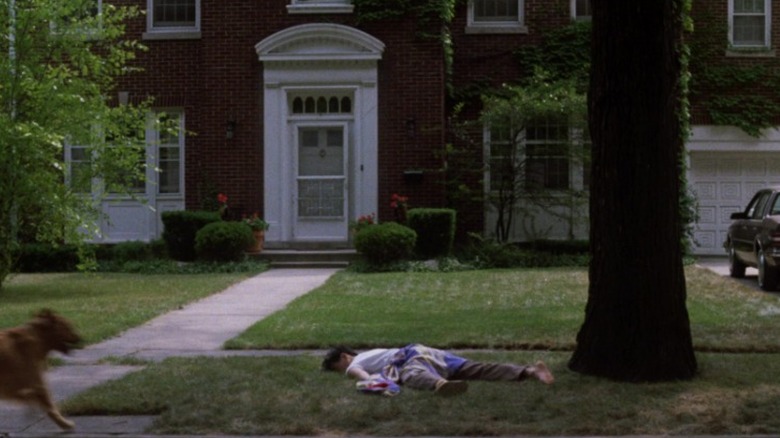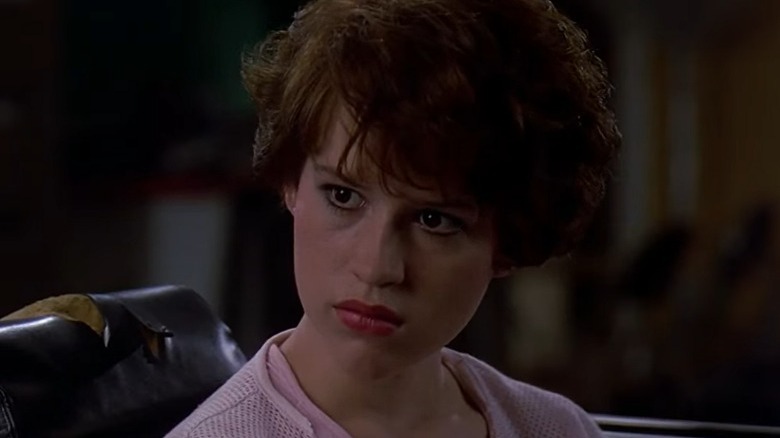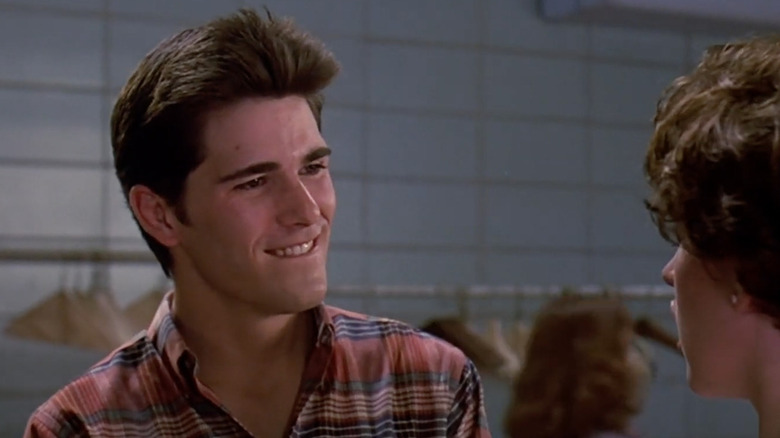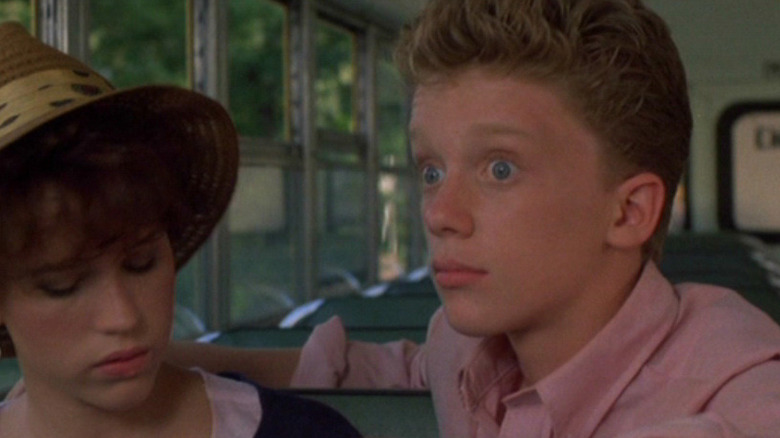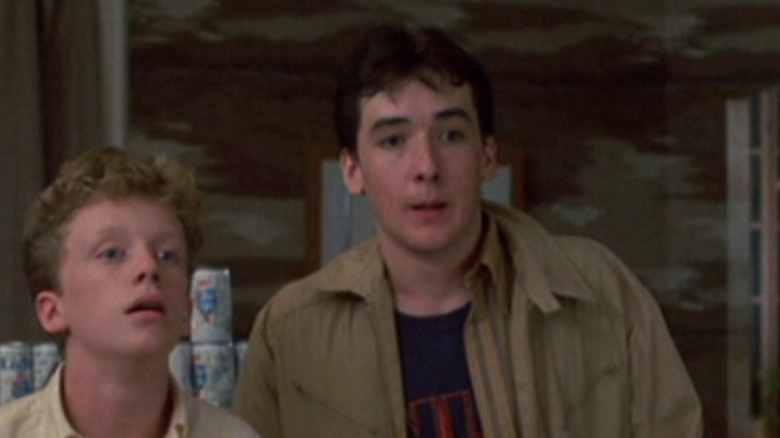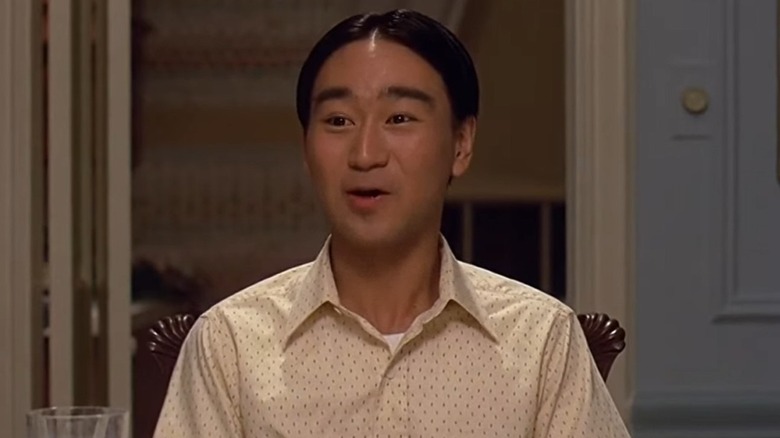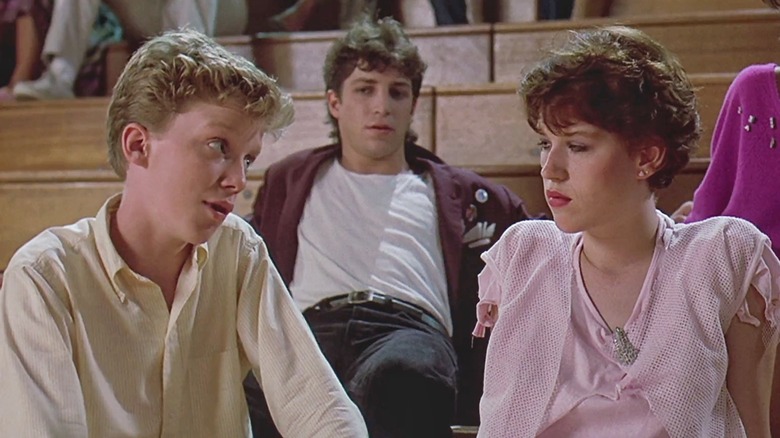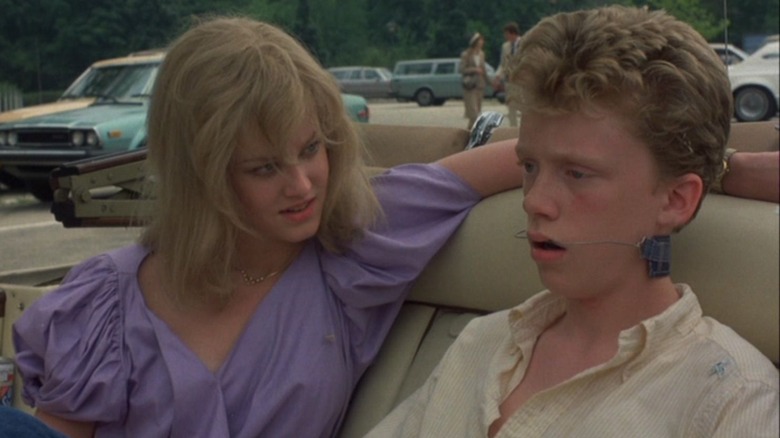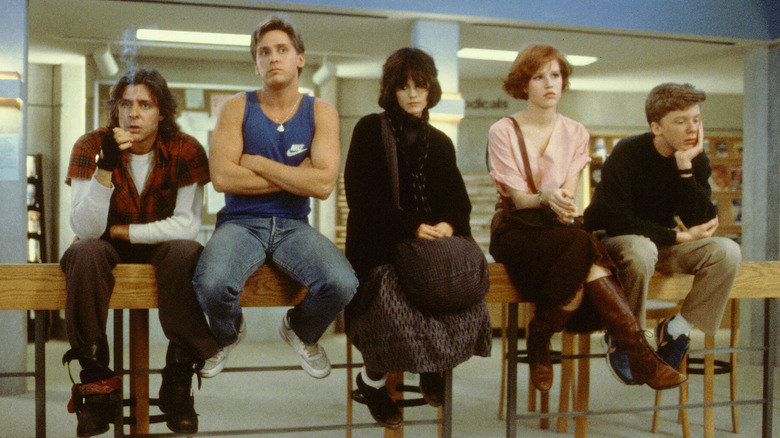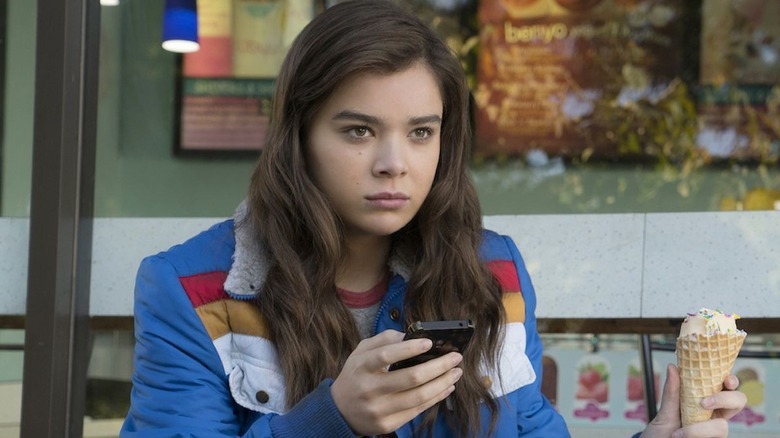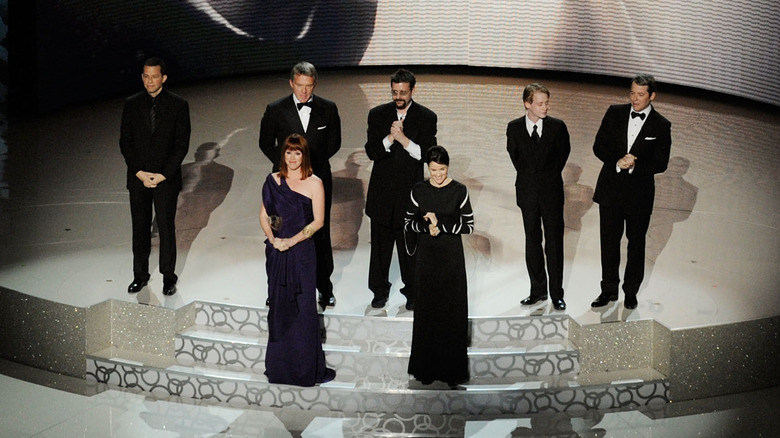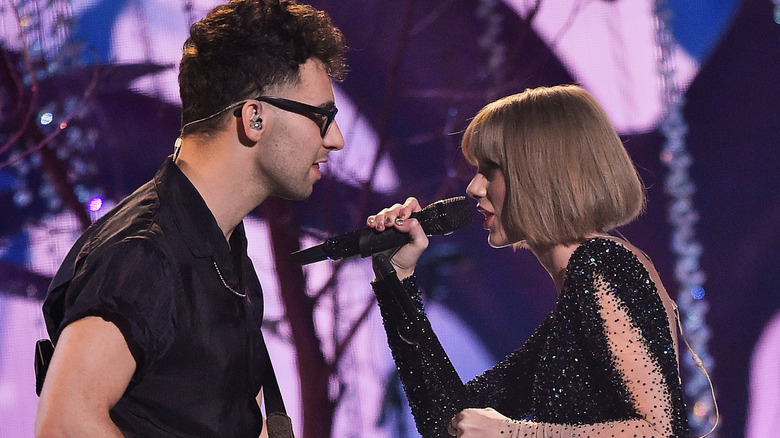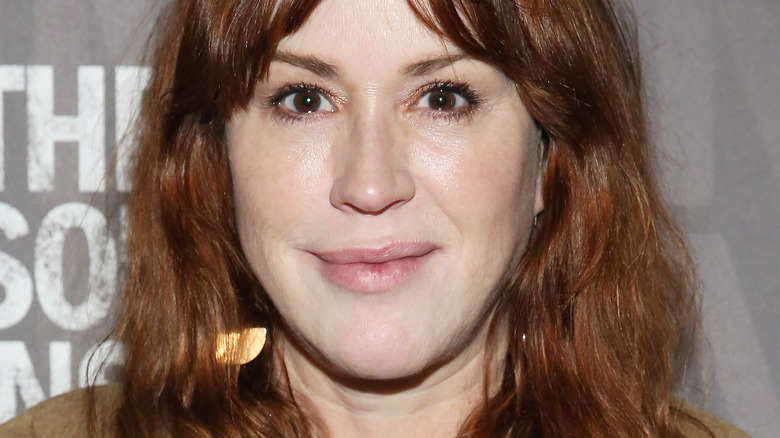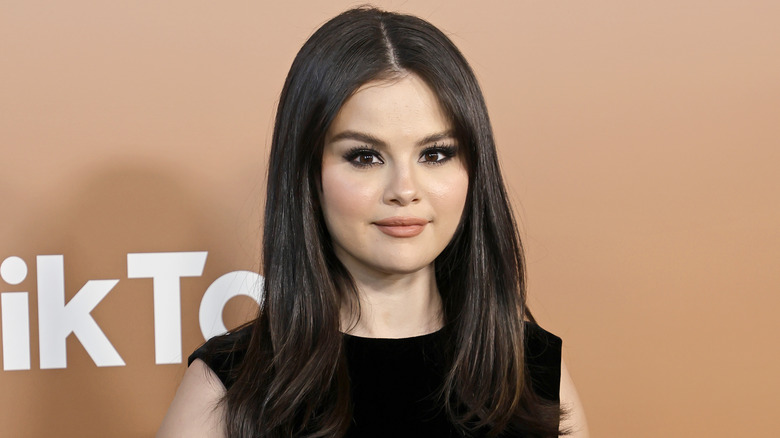Sixteen Candles Facts All '80s Rom-Com Fans Will Love
Few directors have made as indelible a mark on a period of time as John Hughes. The writer and director is mostly known for his teen-centric comedies throughout the mid-to-late 1980s, which starred a group of actors who would become known as the Brat Pack. These movies were not only the pinnacle of their genre when they were released, but they also helped define the childhood and teenage years of many Gen Xers and Millennials.
His first film, for better or worse, remains one of the most significant in the esteemed director's filmography. "Sixteen Candles" was released in 1984 with a cast of soon-to-be movie stars including Molly Ringwald and Anthony Michael Hall. Like many of Hughes' subsequent films, "Sixteen Candles" helped establish a film language that would become essential to the director's work — coming-of-age stories, raunchy teenage escapades, and a soundtrack filled with quintessential 1980s pop classics.
Not only was "Sixteen Candles" a box office success, but it became a blueprint for coming-of-age high school comedies for decades to come. Even long after Hughes retired from making films, "Sixteen Candles" and the impact it had on the film world continues to inspire not only filmmakers, but musicians, artists, and even average teens. For those who are feeling particularly nostalgic about John Hughes' directorial debut — or perhaps discovering it for the first time — these are 16 facts about the film, its actors, its production, and its legacy that every fan of "Sixteen Candles" should know.
John Hughes got his start writing classic comedies
John Hughes had a typical Chicago upbringing prior to the start of his journey toward becoming an acclaimed Hollywood director. After dropping out of college, Hughes became a freelance contributor to National Lampoon, the historic comedy magazine founded by Doug Kenney, Henry Beard, and Robert Hoffman (via The Daily Beast). The magazine and its subsequent success were notable for launching the career of comedians like Chevy Chase, Harold Ramis, and Gilda Radner.
Eventually, John Hughes' contributions to the magazine would land him the opportunity to pen a screenplay based on one of his articles, "Vacation '58." The film would become "National Lampoon's Vacation," starring Chevy Chase in the now-iconic role as bumbling Griswold patriarch Clark. The film, released in 1983, became National Lampoon's biggest hit after "Animal House."
"National Lampoon's Vacation" would just be the start for John Hughes as a writer. In the same year, Hughes also penned the script for the comedy "Mr. Mom," which was also a box-office success. "Mr. Mom" was notable for launching the acting career of Michael Keaton, who would later in the 1980s become the bankable star of "Beetlejuice" and Tim Burton's "Batman." Hughes' early success could have been enough to coast on for the rest of his life, but the writer would soon move on to bigger things.
Sixteen Candles was John Hughes' directorial debut
In 1984, John Hughes made his directorial debut with — you guessed it — "Sixteen Candles." Despite Hughes' involvement, the film fought an uphill battle upon release, as it featured no movie stars (at the time) and was aimed at a teenage audience. Nevertheless, the film captured the spirit of being a high schooler in the early 1980s and spoke to a generation of teens. Albeit, according to Michael Joseph Gross for The New York Times, that generation was "white, middle-class, sensitive, weirdo [teenagers] in 1980's America."
Molly Ringwald starred in "Sixteen Candles" as Sam Baker, a high schooler whose excitement about the prospect of her 16th birthday is overshadowed by her family's focus on the upcoming marriage of her older sister. This day in the life for Sam gets worse as she fails to earn the affection of her crush, Jake (Michael Schoeffling), while also fighting off the googly eyes of the geeky Ted (Anthony Michael Hall). It's a memorable, albeit cheesy, depiction of a 1980s romance, complete with an iconic ending of Sam and Jake sharing a birthday cake and a kiss.
Surprisingly, "Sixteen Candles" wasn't initially going to be John Hughes' first film. According to an essay in The New Yorker written by Ringwald, Hughes had already written the script for "The Breakfast Club" for Universal Pictures with plans to shoot it. However, once he quickly wrote the screenplay for "Sixteen Candles," that project proved to be the more appealing project for studio executives.
The movie was inspired by John Hughes' youth in Chicago
"Sixteen Candles," like many of John Hughes' 1980s coming-of-age films, was filmed in the suburbs of Chicago, namely Highland Park and Evanston. Niles East High School in Skokie, Illinois provided the interiors and exteriors of the school that Sam, Ted, and Jake all attend, which also happens to be the same school that served as the setting for films like "Risky Business" and "Weird Science."
This choice of locations wasn't an accident on the part of Hughes, who spent most of his adolescence growing up in the Chicago suburb of Northbrook. While some of his later films, like "The Breakfast Club," would be filmed at Hughes' own alma mater, these locations in Chicago have become just as iconic for their usage in Hughes' films. Just recently, the house in Evanston, Chicago where Molly Ringwald's character lived in "Sixteen Candles" sold for $1.62 million in 2022, according to The Chicago Tribune.
"Sixteen Candles," as well as John Hughes' other movies that were filmed and take place in the surrounding area, has become a legendary film for the city of Chicago. It's even inspired some modern Chicagoan culture, including the '80s throwback band that named themselves after the movie, which still performs across Illinois.
Molly Ringwald rocketed to movie stardom after Sixteen Candles
One of the biggest impacts that "Sixteen Candles" had on the film industry was launching the career of Molly Ringwald, who prior to Hughes' casting her in the film had only made minor appearances in sitcoms such as "The Facts of Life" and films like "Tempest." John Hughes stumbled on Ringwald's headshot when he was casting "The Breakfast Club," which he ended up directing after making "Sixteen Candles" first. Inspired by her looks alone, Hughes wrote the screenplay for "Sixteen Candles" over a weekend, imagining that he would get Molly Ringwald to play the role of Sam (via CBS News).
Fortunately, this casting choice ended up being fruitful for both Hughes and Ringwald. Publications like The Washington Post praised Ringwald's performance, noting her as charming and engaging. Even modern-day critics who have less than kind things to say about the rest of the movie can't help but vouch for Ringwald, such as when The Spool cited her as one of the film's highlights.
"Sixteen Candles" would just be the start of a very successful career in movies for Molly Ringwald. Aside from continuing to appear in Hughes' films, she notably appeared in commercial successes like "The Pick-up Artist" and "For Keeps." Though being the muse for John Hughes was an honor to experience in one of her first films, Molly Ringwald nevertheless has remained one of the most iconic stars from the 1980s.
Michael Schoeffling was up against a future movie star for the role of Jake
Sam Baker's romantic interest in "Sixteen Candles," Jake Ryan, was played by then-unknown actor Michael Schoeffling."Sixteen Candles" was the 23-year-old's film debut, which was quite a solid start for the young actor's career. Jake is, to a modern-day audience, not the most likable character in Hughes' films, but the charm of Schoeffling was enough to get the attention of teenage girls when the film first came out.
Nevertheless, Schoeffling wasn't the only choice for the role. The actor was up against Viggo Mortensen for the part, predating Mortensen's eventual film debut in 1985's "Witness" alongside Harrison Ford. Molly Ringwald, however, was a big supporter of Mortensen getting the part (via Access Online). However, the role ended up going to Schoeffling, but considering Mortensen would eventually star in Peter Jackson's "The Lord of the Rings" trilogy, everything turned out fine for him.
However, Schoeffling hasn't continued his career as an actor. He quit show business following his 1991 film "Wild Hearts Can't Be Broken," and now has a family and a successful carpentry business. It's probably for the best, considering that modern-day audiences aren't as kind to Jake Ryan as they were in 1984. One article for Elle magazine questioned Jake's status as a heartthrob and took issue with his treatment of his girlfriend Caroline (Haviland Morris) throughout the film.
It wasn't Anthony Michael Hall's first time working with John Hughes
Anthony Michael Hall, despite the morally grey aspects of his character, charmed audiences in 1984 with his portrayal of Ted. This charm was what carried him through his audition, where the young actor competed against soon-to-be stars like Jim Carrey and Keith Coogan. As John Hughes himself would later describe to The Day, Anthony Michael Hall was the only actor to audition for Ted who didn't play the role of a stereotypical geek, instead imbuing the character with humanity.
However, another point in Anthony Michael Hall's corner was his past work with John Hughes. The actor famously starred in "National Lampoon's Vacation" as Rusty Griswold, the son of Chevy Chase's Clark. Hughes was impressed by Hall's talent on set, telling People magazine, "For him to upstage Chevy, I thought, was a remarkable accomplishment for a 13-year-old kid." This talent would pay off for Hall, who would later become a recurring actor in Hughes' films.
Aside from being collaborators, Hall and Hughes grew close as friends while making movies together (via Independent). They reunited two more times before the '80s were over, in "The Breakfast Club" and "Weird Science." The young actor's career trajectory would continue to rise, as he became the youngest cast member on "Saturday Night Live" in 1985 and continued to star in blockbusters like "Edward Scissorhands" and even moved into directing with "Hail Caesar" in 1994.
Two famous siblings made early career appearances
Molly Ringwald and Anthony Michael Hall weren't the only stars to have their breakout roles in "Sixteen Candles." The film also features two future stars in minor roles, John Cusack and his older sister Joan Cusack. For the former, the 17-year-old John Cusack played Bryce, one of Ted's geek friends. John Hughes' coming-of-age was only Cusack's second film, following the 1983 film "Class," but his performance is a certified scene stealer for the brief time he's there.
It wouldn't be long before John Cusack himself became a leading man of the 1980s. In 1985, he starred in "The Sure Thing" and "Better Off Dead..." but it wasn't until he starred in the Cameron Crowe-directed romantic-comedy "Say Anything..." — featuring the now-iconic moment that his character plays "In Your Eyes" by Peter Gabriel on a boombox — that he truly stood out.
Cusack's older sister, Joan, also appeared briefly in "Sixteen Candles" as an unnamed nerdy girl. Even without a name, her character also steals scenes, particularly one where she struggles to drink from a water fountain due to her massive headgear. Joan Cusack would go on to become a movie star in her own right, appearing in classics like "Working Girl," "Toy Story 2," and "School of Rock."
One character has retroactively drawn controversy
Although Gedde Watanabe has accrued many notable credits throughout his career, including "Mulan" and "ER," his film debut in "Sixteen Candles" is probably his best-known. Watanabe played Long Duk Dong, a Korean foreign exchange student whose presence in Sam's house creates even more chaos. The character's quotes remain memorable for fans of the movie, especially his introductory line "What's happenin', hot stuff?" However, most modern-day audiences don't feel the same about the character as audiences in 1984 did.
Kat Chow addressed the character's poor representation of Asian stereotypes in an article for NPR, writing that "Long Duk Dong was an Asian-American cliche for a new generation." Many aspects of the character further these stereotypes, such as the character's broken English and the use of a non-diegetic gong as a sound effect during scenes with him. However, Watanabe has argued against these accusations in an interview with Vulture, defending Hughes' intention of breaking stereotypes by depicting "the Donger" as a party animal.
Some critics have also defended Long Duk Dong's portrayal, including Roger Ebert, who praised the character as a comedic highlight of the film. However, Watanabe has addressed his naivete in accepting the role, though he still stands by its humor (via NPR). Molly Ringwald, on the other hand, called the character a "grotesque stereotype" in a 2021 essay for The New Yorker 2021 that criticized the poorly-aged qualities of John Hughes' movies.
Critics responded positively to John Hughes' depiction of high schoolers
"Sixteen Candles" was an instant classic when it came out in 1984 that secured the stardom of not only Hughes as a filmmaker but Molly Ringwald and Anthony Michael Hall as actors. Ringwald's performance was praised by publications like Variety, with movie critic Roger Ebert calling her "perfect." There was a lot of praise reserved for the film as a whole, too.
In a review for The New York Times by Janet Maslin in 1984, the film was praised for its sweet tone and depiction of adolescence. "Sixteen Candles" was also favorably contrasted with films like "Porky's" or "Animal House," both of which were notable for their raunchy depictions of teenage life. While "Sixteen Candles" does have its share of dirty talk (the film was rated PG in 1984, though by today's standards it would likely be rated R due to its sexual content and language), critics very much favored John Hughes' take on the awkwardness of adolescence.
Some critics didn't share as much enthusiasm as others, such as one reviewer for The Washington Post who criticized Hughes' handling of the story, particularly how Anthony Michael Hall overshines Molly Ringwald's performance as Sam. Nevertheless, the film still earned its marks for the charming cast and humorous tone enough to make up for where some felt John Hughes still had room to improve as a filmmaker.
Modern audiences have criticized the film's creepier moments
Nowadays, a lot of critics and reviewers have more bittersweet feelings when it comes to "Sixteen Candles." It's still true that the film's cast and nostalgic depiction of teenage life in the '80s appeal to many, but others are (rightfully) put off by the film's treatment of its female characters. This is particularly directed towards the film's subplot centered on Anthony Michael Hall's character and Haviland Morris' Caroline, the girlfriend of Jake.
In Jake's pursuits of Sam, he foists a drunken Caroline on Ted, instructing him to drive her home, but not before Ted seizes the opportunity to take photos of himself with the passed-out girl in Jake's Rolls-Royce. The next morning, a hungover Caroline struggles to remember if she and Ted had sex but figures she must've liked it to the excitement of the geek. As one article for Vox analyzing this depiction of sexual assault put it, "the movie expects its audience to respond to that development with righteous glee."
Molly Ringwald had as much to say in her essay for The New Yorker, criticizing the scene but also debating an alternative, less black-and-white opinion from Haviland Morris. Nonetheless, it's an extremely poorly aged blind spot in what was meant to be a light-hearted rom-com.
If you or anyone you know has been a victim of sexual assault, help is available. Visit the Rape, Abuse & Incest National Network website or contact RAINN's National Helpline at 1-800-656-HOPE (4673).
John Hughes continued directing Brat Pack films throughout the '80s
By the time John Hughes finished filming "Sixteen Candles," he already recruited Molly Ringwald and Anthony Michael Hall to reunite on his next film, "The Breakfast Club." Hughes originally wanted Ringwald to play the role of Allison, though the "Sixteen Candles" star campaigned to instead play Claire, with Allison instead being played by Ally Sheedy (via The New York Times). Emilio Estevez and Judd Nelson joined as the other two members of the titular teens, with many actors in the running for the role of Nelson's Bender, including Estevez, John Cusack, and Nicolas Cage.
"The Breakfast Club" centers on a group of five teenagers attending Saturday detention who are all from different walks of life. The film describes them as "a brain, an athlete, a basket case, a princess and a criminal." Despite their individual conflicts and disagreements, the five eventually bond, sharing secrets and insecurities. All the while, they avoid further disciplinary action from the strict Vice Principal Vernon, played by Paul Gleason.
Following the release of "The Breakfast Club," the central cast of actors became known in Hollywood as the Brat Pack, as they continued to appear together in movies made by Hughes and other filmmakers. Future films like "St. Elmo's Fire," "Weird Science," and "Pretty in Pink" would further the cinematic legacy of Hughes' early films, even as the director transitioned to more adult-centered films like "Planes, Trains, and Automobiles" and "Uncle Buck."
The Brat Pack continue to inspire modern-day filmmakers
John Hughes infamously retired from the public eye later in his career, directing his final film, "Curly Sue," in 1991 and spent the rest of the '90s penning scripts for other directors. The films he is credited as a screenwriter on from that period include "Home Alone," "Flubber," and "101 Dalmatians." By the early to mid-2000s, Hughes was no longer writing or directing, though his impact remained large. His influence on teen movies in particular throughout the 2000s and 2010s would continue to define generations of kids and teens.
Many modern classics, like the Judd Apatow-produced "Superbad" and Olivia Wilde's directorial debut "Booksmart," take inspiration from Hughes' earliest films, especially the irresponsible antics of "Sixteen Candles." "The Breakfast Club" would also inspire TV shows like "Community," which heavily references the film throughout its first episode. Hughes' name would also be referenced in the name of high schools in films like "Not Another Teen Movie," as well as the Disney Channel original series "Shake It Up."
One director who cites John Hughes' work as a major influence is Kelly Fremon Craig, the writer-director who made "The Edge of Seventeen." This film, which was released in 2016, is like a John Hughes film that was never made. It stars Hailee Steinfeld as a 17-year-old girl who struggles after the sudden death of her father. Following the film's premiere at TIFF, some critics even declared "The Edge of Seventeen" a love letter to Hughes' films, albeit presented for a more modern audience.
John Hughes suddenly passes away in 2009
The film world was awestruck in 2009 when John Hughes suddenly passed away at the age of 59. Even though the director had retreated from show business with his family in Chicago, the impact of Hughes' tragic passing was felt all across Hollywood, inspiring countless tributes, eulogies, and dedications to the writer-director who, for better or worse, influenced an entire generation with his earnest films. Take it from Judd Apatow, who said following the director's death that it felt as if " a part of my childhood has died" (via Los Angeles Times).
Many of Hughes' former collaborators also offered tributes to the director, including Matthew Broderick and Macaulay Culkin, whose careers were kick-started by "Ferris Bueller's Day Off" and "Home Alone," respectively. Molly Ringwald also dedicated a bittersweet tribute to Hughes in The New York Times, claiming that while she dearly missed Hughes, she also feared he had held a grudge against her for turning down a role in his film "Some Kind of Wonderful."
At the Academy Awards in 2010, several actors who worked with Hughes, including four of the five Breakfast Club members, paid tribute to Hughes during the ceremony. The director also received a tribute in 2020 when Josh Gad organized a cast reunion for "Ferris Bueller's Day Off," recruiting many actors, including Chevy Chase and Julia Louis-Dreyfus, to recreate their most iconic moments from the Hughes films they starred in.
2010s popular music shifts into sounds inspired by John Hughes films
John Hughes' impact on pop culture stretches far beyond movies and TV shows. Several popular musical artists of the 2010s specifically drew inspiration from his work when making some of the biggest records of the decade. Artists like The 1975, an indie rock band from England, cited movies like "The Breakfast Club" and "Sixteen Candles" as an influence on their self-titled first album, which was released in 2013 (via NPR).
In 2014, one of John Hughes' biggest impacts on the music world was seen when Taylor Swift put out her Grammy-winning album "1989," which famously saw the singer veer from country into 1980s-inspired synth-pop. In an interview published in GQ, Swift cited John Hughes' movies as inspiration from her songs both lyrically and sonically, which music critics certainly picked up on with tracks like "Out of the Woods" (via MTV). That song was produced by Jack Antonoff, who has made a name for himself in the music industry for his '80s-influenced sounds, mentioning in an interview with Billboard that the song was developed after a conversation with Swift over their mutual love for him for John Hughes' work.
Antonoff, who also performs his own music under the name Bleachers, got to flex his love for John Hughes when composing the soundtrack for the 2018 romantic-comedy "Love, Simon," which has many nostalgic Hughes-esque qualities. During a roundtable discussion hosted by The Hollywood Reporter, Antonoff gushed over his love for John Hughes and the emotion his songs invoked in kids growing up in suburban America.
The stars of Sixteen Candles still reflect on the film almost 40 years later
In 2024, "Sixteen Candles" reaches its 40th anniversary, which will likely produce bittersweet feelings for fans and actors. In recent years, Molly Ringwald has made numerous retrospectives examinations of the film and its content, telling NPR in an interview, "times were different and what was acceptable then is definitely not acceptable now and nor should it have been then." Ringwald also cited Bo Burnham's 2018 film "Eighth Grade" as an example of a modern-day film that gets teenage life right.
Despite her mixed feelings about the films, Ringwald remains proud of her work with John Hughes. In February 2022, the actress shared on Instagram a text exchange with her mother where she had forgotten her 54th birthday, humorously quipping, "Life imitates art" (via New York Post). Anthony Michael Hall also has fond memories of the film and The Blade reports that the actor still hosts screenings of it as recently as 2022.
When the film turned 35 in 2019, Page Six gathered together members of their team to look back on the film and discuss whether it still holds up. While some held it in high regard for its nostalgia and charm, others were extremely put-off by how much it's aged, especially in light of the #MeToo movement. Its 40th anniversary will definitely bring a new discussion around the film, as critics and audience members alike marvel at how much culture has changed in the span of 40 years.
Selena Gomez is producing a spiritual successor for Peacock
"Sixteen Candles" also won't be leaving public discourse for another big reason. It was reported in March 2022 that Selena Gomez would be executive producing a Peacock comedy series based on John Hughes' film, titled "15 Candles." The series, according to a statement in Variety, will center on a group of Latina girls in high school and their coming-of-age, particularly surrounding their traditional quinceañera celebrations.
The show will be co-developed by Tanya Saracho and Gabriela Revilla Lugo (via Billboard), who bring along experience in show business and furthering Latina representation. Saracho was the showrunner of the Starz series "Vida," while Lugo was previously a writer on the ABC drama "A Million Little Things." The series already has encouragement from Molly Ringwald, who told Deadline she's ecstatic about the idea of someone taking inspiration from one of her movies and making something completely different.
Given Gomez's involvement, it's likely this show will be massive. Selena Gomez previously executive produced the Netflix series "13 Reasons Why" and also stars in and produces the Hulu series "Only Murders in the Building" alongside Steve Martin and Martin Short. She also has an HBO Max cooking show, "Selena + Chef," further demonstrating that Gomez's reign in television continues to grow. "15 Candles," the latest addition in her television-producing repertoire, might be the perfect opportunity to pay tribute to Hughes' film while also updating it for a modern audience.
